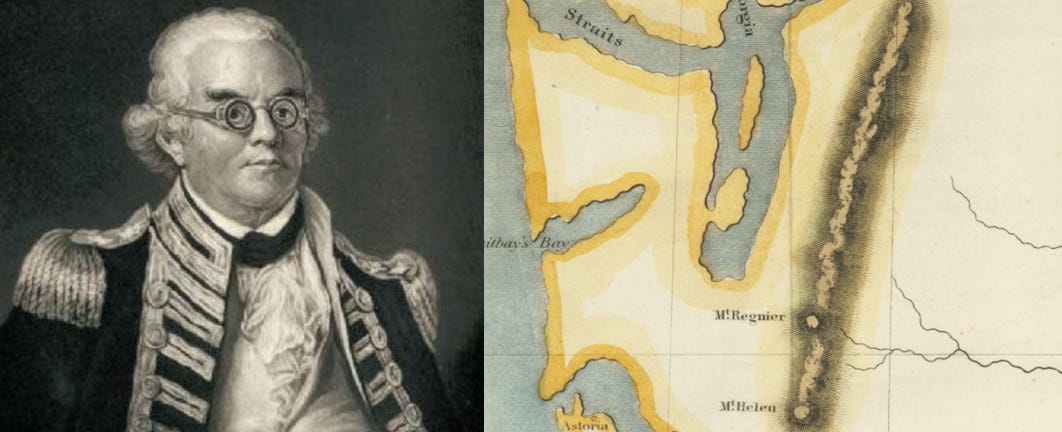I have long been interested in the origin of place names. Consider two of the most famous modern ones in the Pacific Northwest: Mount Rainier and Puget Sound. Both originate with George Vancouver and his expedition to the region in 1792. On May 7, he wrote in his journal of a “round snowy mountain..which, after my friend Rear Admiral Rainier, I distinguished by the name of Mount Rainier.” At the end of the month, Vancouver added “to commemorate Mr. Puget’s exertions, the south extremity of it I named Puget’s Sound.”
Both place names coincidentally happen to honor a guy named Peter but more intriguingly both names occur here because of King Louis XIV of France. As sadly so often has happened through history, Lou (as I am sure his pals called him) didn’t tolerate people who held different religious beliefs. Nearly a century prior to his reign, Lou’s grandpere (Ah, oiu!) Henry IV had signed the Edict of Nantes, which gave the Calvinist Protestants of France substantial rights in the Catholic nation. Because monsieur XIV didn’t cotton to his predecessor’s beliefs, Louis signed the Edict of Fontainebleau in 1685 and formally began to persecute Protestants, particularly the Huguenots, as the Calvinists were known.
Not surprisingly, the state-sponsored hostility led to Huguenots abandoning their homeland. Many settled in England, including a family from western France who spelled their name Regnier. Daniel Regnier moved to a small town in the south of England, where he married and had children, all with the English name of Rainier. One of those was Peter Rainier, who married Sarah Spratt, who gave birth to Peter Jr., in 1741, in Sandwich. Peter the younger eventually went to sea, befriended George Vancouver, and now has a mountain that he never saw named for him.
Peter Puget’s family also were of Huguenot stock, though their story is a bit muddier. They appear to have come from the Languedoc district in southern France and moved to Dublin, initially perhaps with the name of Pugett, or possibly Pugitt, Pewgett, or Pugette, all names mentioned in The Puget Family in England by Percy G. Dawson. Peter’s grandfather was John Puget, a very successful banker, who was born in 1691, though it’s not known where. Peter was born in 1765 and his father was also a banker. Peter eventually went to sea where he sailed with George Vancouver and now has an inland sea that he saw named for him.
Neither Rainier nor Puget really amounted to much, or at least much that merited their modern notoriety. They both achieved the rank of Rear Admiral but I suspect that there were scores who did so, few of whose names are in such common parlance as these two Peters. Their greatest attribute in life appears to be their connections with George Vancouver.
Rainier and Puget are not the lone names for the places that honor them. Native people on either side of the Cascades have long known the mountain as a variation of Takoma or Tahoma, including Taxo-ma, Taqo-bid, and Tacobet, meaning the source of all waters, snow peak, or white mountain. The great inland body of water has long been known as xw̌əlč—oftenwritten in English as Whulge. The word comes from Lushootseed and means a stretch of saltwater. It is an onomatopoeic word: the verb form refers to the noise that waves make as they come up on the beach.

I like the Indigenous names because they are based on deep connections and observations from people who have long inhabited a landscape. In contrast, the modern names derive from an individual’s whim, in particular, an individual whose connection to place only extended back a week or two. I can’t completely fault Vancouver for what he did; who wouldn’t want to honor their friends and colleagues. But we now live in a time where people are reconsidering place names and what they mean and how they cause harm and feel unjust for many. These reckonings are clearly a good idea. The more we acknowledge the past and learn from it, the more we can help foster a just society for all. I am sure the Huguenots would have understood these concerns.
Word of the Week - Cotton - To succeed, to go on prosperously: a metaphor, probably, from the finishing of cloth, which when it cottons, or rises to a regular nap, is nearly or quite complete. From Robert Nares · A glossary: or, collection of words, phrases, neames, and allusions to customs, proverbs, &c · 1822.
One final thought. Not only do the names Puget and Rainier mean that French-derived names occur in the region but we also have an often overlooked Spanish legacy. At the north end of Puget Sound are names such as Rosario, Haro, Lopez, and Guemes, all derived from the first known Europeans to visit here. Each was part of the wave of Spanish explorers who sailed down the Strait of Juan de Fuca prior to Vancouver. No wonder I like place names; they have so many stories to tell.







I'm always amazed at the stuff you find to write about. It is well researched and documented. Keep it up.
This was a wonderful article - it is making my historical loving heart sing this morning. I too often wonder about names of places and why?
On the mountain and water that inspire our way of life here, I tend to call the mountain Tahoma. It just seems to fit the mystical quality of her. What about the sound having another name that mimics the sound of waves? That is inspiring as well. I will have to practice pronouncing Whulge.
My Friday has begun in such a magical way!! Gracias!!